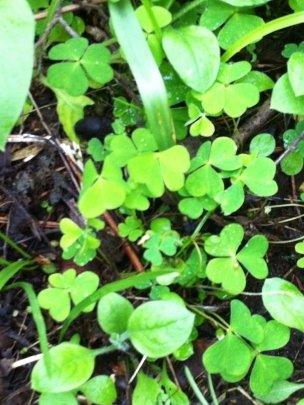State of nature: Recognising unsung heroes and habitats
- Published
- comments

Wild wood sorrel in Stoke
With Springwatch in full bloom on BBC Two and on Midlands Today it's worth looking in a bit more detail at the newly published State of Nature, external report.
Put together by over 20 different nature and conservation organisations the idea is to give a snapshot, a stock take, of how UK wildlife is doing.
We'll get to the report proper in a moment but what really struck me as I read the report was how little we really know about nature in the UK.
In terms of wildlife there's a huge bias in data gathering towards the fluffy and attractive and the more slimy and dull the species the less we know.
So, we know much more about shrews and sparrows than we do about snails and slugs.
Vital volunteers
But the other thing that struck me about the data we do have is how important volunteers are in gathering all of it.
I've met volunteer wildlife recorders in the past and they are amazing people. It's a great hobby and with dedication you can end up as the expert for your county in a particular species. If you focus on recording slugs or snails you could end up as a national expert.
Without volunteers we'd know even less about how our wildlife is doing although the overall message of the report is it's doing pretty badly. The big headline is that 60% of species have declined over the last 50 years.
'Heartening'
But there are success stories and a report like this can mark them and help us apply lessons learnt to other species.
It can also help us recognise the importance of some less appreciated habitats.
Thanks to data gathered in Warwickshire we know that the best brownfield sites "match ancient woodlands in terms of the numbers of species, especially rare ones, found there."
As David Attenborough says in the foreword it is "heartening" to see so many organisations coming together, millions of members of groups like the RSPB and the Wildlife Trusts looking to help and protect our wildlife.